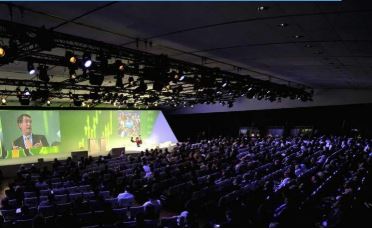
- Digital transformation and sustainability continue to redefine the global consumer goods industry
- Wide range of new technologies present exciting opportunities for business to address these challenges, often through collaboration
- Generation Z proving even more demanding and sceptical than Millennials
PARIS, 25 June 2019 – Digital transformation and sustainability are the key challenges facing the consumer goods industry, according to attendees of The Consumer Goods Forum (CGF) Global Summit. Held in Vancouver, Canada, the organisation’s flagship event hosted more than 900 delegates – CEOs and C-level executives from the world’s leading players in retail, manufacturing and services – to discuss industry trends and challenges.
Industry experts were optimistic about the opportunities these changes presented for retailers and brands, with particularly high hopes for the potential of a wide range of new technologies including AI, robotics, data analytics, cloud computing, chemical recycling, smart farming and satellite monitoring amongst others. Experts also warned that consumer companies must continue to refit their businesses for digital success, find ways to be more environmentally sustainable, and learn how to build trust in order to engage the Gen Z market.
Industry braces for unprecedented change
The consumer goods industry remains in the throes of a period of fast-paced change. Digital technologies are challenging the status quo, and environmental issues are calling on the industry to re-think the way it consumes resources.
- Digital disruption: Executive Chairman of Colgate-Palmolive and outgoing CGF co-chair Ian Cook opened up the conference outlining how an array of digital technologies – from AI to cloud computing – is redefining the way business operates.
- Environmental concerns: President and CEO of McCain, Max Koeune, voiced concerns about growing populations, which will have implications for land use, greenhouse gas emissions and water depletion. “Business as usual is not an option,” he said.
Pressure mounts to embrace opportunities of change
Discussions at the Summit centred on the opportunities that industry disruption has opened up for consumer brands and retailers.
- The transformative potential of digital technology: Industry leaders highlighted the opportunities for consumer brands to leverage technologies like data analytics, cloud computing and AI to bring strategy and efficiency to their operations, and higher value to their offerings. One such example came from CEO of Bold Metric, Daina Burnes, whose company has developed a technology that predicts body measurements, helping shoppers select the right-sized clothing. Retail CEOs Frans Muller of Ahold Delhaize and Rodney McMullen of Kroger both highlighted the importance of partnerships with digital specialists to help drive change in their companies.
- Urbanisation boosts mass retail: L’Oréal’s Chairman & CEO, Jean-Paul Agon, and President of Consumer Products Division, Alexis Perakis-Valat, emphasised opportunities for growth in the mass retail channels, which are slated to double in value in the next ten years thanks to urbanisation and digital. Beauty is particularly well placed to reap rewards from the rising importance of social media and online video.
Consumer companies to take action
Experts agreed that companies must improve their digital skills and sustainability profiles, as well as their ability to engage the Gen Z demographic, if they hope to survive the industry upheaval.
- Skills of the future: Canada’s leading food retailer Loblaw spoke about the growing importance of digital skills within its own company. The company’s president, Sarah David, referenced an investment of $250m over the next five years in digital re-skilling, as well as the employment of 1,000 people in digital roles. President and CEO of Ahold Delhaize, Frans Muller, also highlighted the importance of achieving transparent and ethical use of data. He said consumer trust is less hinged on food safety, and more focused on “can I trust you on how you handle my data?”
- Getting serious on sustainability: The need to reduce the industry’s impact on the environment has long been a key priority for the CGF. Loblaw’s Executive Chairman, Galen Weston, focused on the challenge of plastic waste, highlighting the initiatives being taken by many retailers across the industry as well as innovative recycling start-ups.
- Engaging Gen Z: The industry agreed on the importance of establishing sincerity and trust in order the win the support of Millennial and Gen Z customers in particular. Nestlé’s CEO, Mark Schneider, spoke to the importance of having a purpose as an organisation, beyond delivering financial success. Co-Founder of Futerra, Solitaire Townsend, highlighted the more demanding and sceptical nature of Gen Z consumers compared to Millennials. Describing them as the “honest generation,” she said that Gen Z are now demanding proof of a company’s purpose.
Peter Freedman, Managing Director, The Consumer Goods Forum said: “Across the world companies in the consumer industry now recognise the twin imperatives of adapting to the digital world and responding to consumers’ desires for honesty and sustainability. At this year’s Global Summit we saw numerous examples of the role that collaboration can play in accelerating these transformations – including partnerships between traditional competitors within the industry but also with start-ups and tech leaders from outside the industry. The CGF will continue to nurture these collaborations over the year ahead, as part of our daily work to drive positive change for consumers.”
The Global Summit brings an unparalleled opportunity to network with CEOs from some of the world’s most successful companies, and gain insights into the challenges faced by retailers, manufacturers and their service providers in the consumer goods industry. More: www.tcgfsummit.com
###
About The Consumer Goods Forum
The Consumer Goods Forum (“CGF”) is a global, parity-based industry network that is driven by its members to encourage the global adoption of practices and standards that serves the consumer goods industry worldwide. It brings together the CEOs and senior management of some 400 retailers, manufacturers, service providers, and other stakeholders across 70 countries, and it reflects the diversity of the industry in geography, size, product category and format. Its member companies have combined sales of EUR 3.5 trillion and directly employ nearly 10 million people, with a further 90 million related jobs estimated along the value chain. It is governed by its Board of Directors, which comprises more than 50 manufacturer and retailer CEOs. For more information, please visit: www.theconsumergoodsforum.com.






